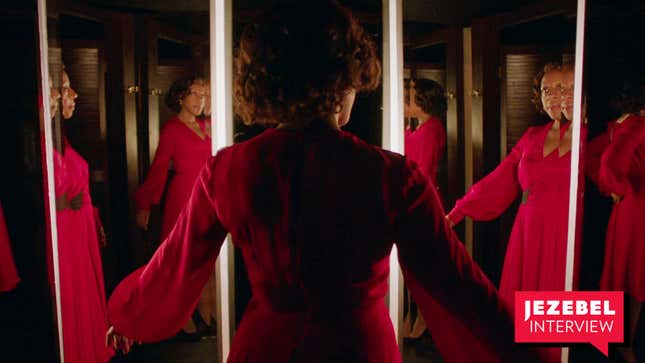Marianne Jean-Baptiste on Entering the Bizarre World of In Fabric
Entertainment
Image: A24
In a follow-up to our interview with In Fabric director Peter Strickland, one of the film’s stars, Marianne Jean-Baptiste, tells Jezebel what it was like to enter the bizarre world of killer dresses and cultlike department stores in the strangest movie she’s ever filmed.
Baptiste is, in many ways, a pioneer. After her breakout role in Mike Leigh’s 1996 movie Secrets & Lies (for which she received an Oscar nomination), she wasn’t included in a group of British actors sent to the Cannes Film Festival by the British Screen organization for an anniversary celebration in 1997. (This despite Secrets & Lies’s tremendous success at Cannes where it won three awards, including the Palm d’Or.) “The old men running the industry just have not got a clue,” Jean-Baptiste told The Guardian at the time. “They’ve got to come to terms with the fact that Britain is no longer a totally white place where people ride horses, wear long frocks and drink tea. The national dish is no longer fish and chips, it’s curry.” Thus, years before OscarsSoWhite led the charge for a national, mainstream conversation about diversity in film, Baptiste did so in public, unflinchingly. The conversation, though, has followed Baptiste since then, perhaps climaxing in an exasperated 2015 interview, again with The Guardian.
“I’m really tired of it because I can read an interview with any number of white actors and actresses and they speak about process and about the script and about their castmates and about the journey, but every time you read an interview with a black actor it’s the same stuff they get asked over and over again,” Jean-Baptiste said then. I revisited this conversation with her briefly, though, in our phone chat, the transcript of which appears below in edited and condensed form.
JEZEBEL: Is it fair to say that In Fabric is the strangest movie you’ve ever appeared in?
MARIANNE JEAN-BAPTISTE: Probably! But I hope that changes and I get to do something stranger.
What were your first impressions of the script?
I was sent the script and I thought, Man, this could go two ways. It could be really good, or it could be really like… oy! I thought, That’s good, though. I liked the character, someone I’ve never had an opportunity to play before. I loved the unsettling nature of it. I was very intrigued about how [Strickland] would do it. I’d seen Berberian Sound Studio, so I was already on his side. It was really about just playing, exploring, going for something that wasn’t result-based.
Are you into fringe-y, cult cinema? Did you have any relationship to the movies that are invoked in Strickland’s past work, of the gialli or Eurosleaze varieties?
-

-

-

-

-

-

-

-

-

-

-

-

-

-

-

-

-

-

-

-

-

-

-

-

-

-

-

-

-

-

-

-

-

-

-

-

-

-

-

-








































